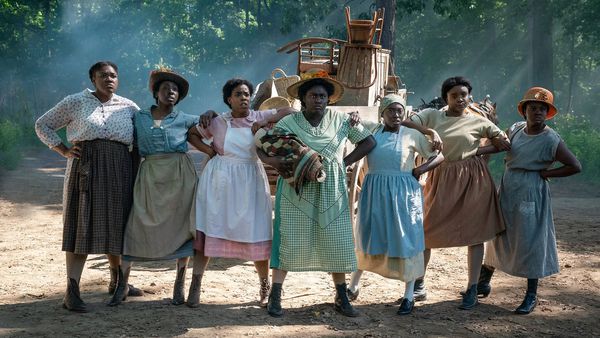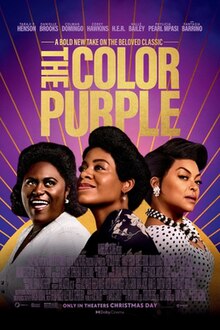Eye For Film >> Movies >> The Color Purple (2023) Film Review
The Color Purple
Reviewed by: Jennie Kermode

A big screen adaptation of a stage musical adaptation of one of the most written-about books in US literary history, Blitz Bazawule’s take on The Color Purple comes to the screen with more than the usual amount of baggage, so perhaps the most surprising thing about it is how lightly it plays. There are conscious choices at work behind this. Whilst it’s a story founded on suffering, if one digs just a little may back into history, so are the majority of African American stories, and a culture of resistance has grown up around that. It’s the celebration of that culture which is really at the core of this film. When its cast bursts into songs with roots in the gospel tradition, they are not praising God just for the sake of it, but expressing the profound gratitude and joy which comes from having survived against the odds.
The story opens a little way in, as then-14-year-old heroine Celie is in the process of being forcibly separated from her second child, both of them products of rape but very much wanted nonetheless. Wasting no time, it rushes into her arranged marriage to ‘Mister’ (Colman Domingo), whose abuse she takes for granted after what has gone before. Only her relationship with her sister Nettie (played as a child by The Little Mermaid herself, Halle Bailey) brings joy at this stage in her life, and it’s a shame to see their separation rushed as well, but they do get a couple of songs ahead of that and there is enough chemistry between them, enough sweetness to linger after Bailey departs.

As the teenage Celie, Phylicia Pearl Mpasi conjures up a striking resemblance to the young Whoopi Goldberg, as much through her manner as her facial features, so that one almost feels as if one has stepped back into the 1985 film. Goldberg herself appears in a cameo, and that’s just one of numerous connections which enrich but don’t distract from Bazawule’s take. The reason for this early haste would seem to be his eagerness to introduce the other characters and build up the supporting ensemble, not just because that’s where the strongest songs emerge but because this, more than the Spielberg version, focuses heavily on the social relationships between women which were central to Alice Walker’s novel.
It’s a powerful thing to see a big budget film with so many dynamic Black female characters, any one of whom could carry a film by herself. Danielle Brooks is a particular delight as the forceful Sofia, wife to one of Celie’s stepchildren and a woman who takes no shit from anybody. Even at her darkest hour, she has a presence which fills up a room. It isn’t possible to tell her story, of course, without introducing white characters and the spectre of racism, but other than that they have been largely excised from the story, so much dead wood. Here, Black lives are explored on their own merits, independently of all that, and the film is all the better for it.
Also different here, and long overdue, is a presentation of Black bodies which doesn’t squeeze them into a white Hollywood beauty standard. Taraji P Henson’s glamorous out-of-town singing sensation Shug Avery is as sexy as ever but she’s a woman who has plenty of curves and is not afraid to use them. A stunning sequence in which she and Celie (now an adult and played by American Idol winner Fantasia Barruso) dance in sequinned flapper dresses on an old fashioned RKO musical-style stage makes no apology for their more robust figures and, as such, goes beyond symbolic glamour to present a more immediately compelling portrait of two women falling head over heels in lust with one another.
For Celie, of course, it’s more than lust, and here’s where the film is a little disappointing. Although we see the two in bed together and the song lyrics talk about love, the ease with which they part makes less of an emotional impression that Spielberg’s film and comes nowhere close enough to showing us the deep and abiding passion present in the novel. This is unfortunate not just because it sidelines that aspect of their sexuality, but also because it dilutes a key aspect of Celie’s journey. Her endurance and eventual fightback against oppression are effectively realised but we don’t see the shift from accepting her own value when she sees it reflected in the object of her affections, to understanding that she is enough in and of herself.
In place of this part of the story comes a journey explicated through music and the gradually shifting tone of the songs, aided by Fatima Robinson’s vibrant choreography. A lot of fun is had with reference to the big hit musicals of Hollywood’s Golden Age, from which Black people were mostly excluded, whilst there are also pieces which make no secret of having originated on the stage. A dance performance in a half-built house is particularly noticeable in this regard, as nobody would go about constructing a house in that manner if they did not intend it to function as a stage along the way. When we finally reach Celie’s tailor shop, Robinson has all she needs to put on a real show, and though the music may still belong to an earlier era, the spirit of disco is there in the clothes.
Not all of these songs are perfectly timed to fit into the story, some cutting in and out at odd moments or seeming to miss an emotional beat, but there is nothing to complain about with regard to the way they are performed. Bazawule has a cast to die for. The male members of the cast also deliver some slick dance moves. The Color Purple has, of course, been critiqued in the past for its treatment of male characters (though the presentation of Black men as violent is, arguably, only a major problem in the context of white people’s stereotypes of them, and such violence still needs to be able to be discussed in other contexts). Bazawule deals with that in two ways: first, by presenting a number of men in minor roles whose very different behaviour makes it clear that the violence we see is a choice, and secondly by giving Mister a redemption arc (though viewers need not worry that this actually requires Celie to take him back).
Though it has its flaws, this is, all in all, a successful take on the story and a valuable piece of cinema. It doesn’t feel like the definitive take on Walker’s work, even from this particular angle, but it’s a solid contribution to the conversation, and, perhaps most importantly of all, it’s a film that will give most audience members what they came for.
Reviewed on: 07 Jan 2024
















